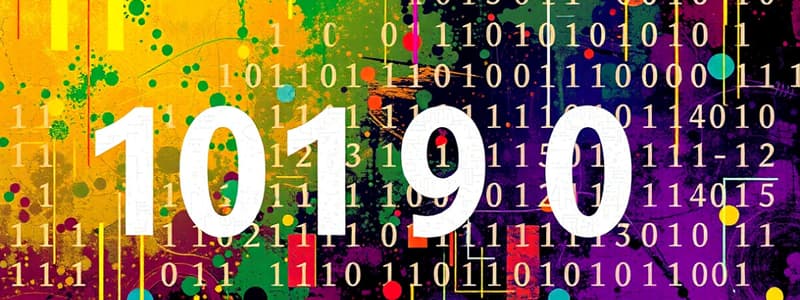Podcast
Questions and Answers
What are the main components of a digital computer?
What are the main components of a digital computer?
The main components of a digital computer are the CPU, memory, and I/O devices.
Explain the purpose of a compiler in computer languages.
Explain the purpose of a compiler in computer languages.
A compiler translates high-level programming code into machine code, making it executable by the computer.
What is the significance of Gray Code in digital systems?
What is the significance of Gray Code in digital systems?
Gray Code minimizes the risk of errors during transitions between values because only one bit changes at a time.
How do you perform binary addition using the 1's complement method?
How do you perform binary addition using the 1's complement method?
What are Karnaugh Maps used for in Boolean algebra?
What are Karnaugh Maps used for in Boolean algebra?
Describe the function of a full adder in combinational circuits.
Describe the function of a full adder in combinational circuits.
What is a flip-flop and its role in sequential circuits?
What is a flip-flop and its role in sequential circuits?
Explain the difference between system software and application software.
Explain the difference between system software and application software.
Flashcards
Computer Fundamentals
Computer Fundamentals
Introduction to basic computer concepts, including components (like CPU, memory, I/O), software types and languages, and the computer's basic organization.
Number Systems
Number Systems
Different ways of representing numbers (decimal, binary, octal, hexadecimal), conversions between them, and arithmetic operations in binary.
Boolean Algebra
Boolean Algebra
A mathematical system for logical operations using variables and operators (AND, OR, NOT).
Logic Gates
Logic Gates
Signup and view all the flashcards
Combinational Circuits
Combinational Circuits
Signup and view all the flashcards
Sequential Circuits
Sequential Circuits
Signup and view all the flashcards
Binary
Binary
Signup and view all the flashcards
Flip-Flops
Flip-Flops
Signup and view all the flashcards
Study Notes
Computer Fundamentals Syllabus Breakdown
- Unit 1: Fundamentals of Computers (11 hours)
- Covers computer definitions, characteristics, history, and types.
- Explores computer organization (CPU, memory, I/O devices).
- Explains input/output organization and peripheral devices.
- Details memory organization and system types.
- Discusses software types (system, application, utility).
- Introduces computer languages (machine, assembly, high-level).
- Explains language translators (assembler, interpreter, compiler).
Number Systems (Unit 2) (11 hours)
- Focuses on decimal, binary, octal, and hexadecimal number systems.
- Explains conversions between these number systems.
- Details binary arithmetic operations (addition, subtraction, multiplication, division).
- Covers 1's and 2's complement for subtraction.
- Explores Binary Coded Decimal (BCD) addition.
- Introduces Gray Code and Excess-3 Code, including their conversions and applications.
Boolean Algebra and Logic Gates (Unit 3) (11 hours)
- Examines Boolean algebra laws and theorems (De Morgan's, duality).
- Explains simplification methods using Sum of Products (SOP) and Product of Sums (POS).
- Focuses on Karnaugh Maps (up to 4 variables, including don't cares).
- Details basic, derived, and universal logic gates.
Combinational and Sequential Circuits (Unit 4) (11 hours)
- Discusses combinational circuits like half adders, full adders, half subtractors, and full subtractors.
- Explores sequential circuits and flip-flops (SR, JK, Master-Slave JK, T).
- Covers decoders, encoders (3-to-8 line decoder, octal-to-binary encoder).
- Explains multiplexers and counters (4-to-1 multiplexer, 3-bit binary ripple counter).
- Details shift registers (serial-in-parallel-out, parallel-in-serial-out).
Studying That Suits You
Use AI to generate personalized quizzes and flashcards to suit your learning preferences.
Description
Test your knowledge on the fundamentals of computers and number systems. This quiz covers computer definitions, organization, software types, and various number systems including binary, decimal, octal, and hexadecimal. Dive into binary arithmetic operations and their applications to validate your understanding.




